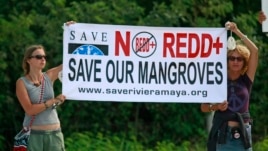Carbon Credits Ready for Sale in Oddar Meanchey Forest
VOA | 12 Jan. 2014
PHNOM PENH — Cambodia’s first verified
carbon credit program is up and running in the remote province of Oddar
Meanchey. But experts say there are limited carbon credit buyers, and
illegal deforestation remains a major threat to the stability to the
project.
The so-called REDD+ project, a United Nations initiative to reduce carbon emissions that contribute to global warming, began in Cambodia in 2008. Some 16 projects, officially called Reducing Emissions From Degradation and Deforestation, are now underway in Cambodia. The Oddar Meanchey project is the first to be verified and have credits ready for purchase.
The Oddary Meanchey project was the first to be implemented, and seeks
to safeguard 13 different communities across 64,000 hectares of forest.
It has achieved a “gold” standard across three criteria in the
integration of climate, community and biodiversity benefits.The so-called REDD+ project, a United Nations initiative to reduce carbon emissions that contribute to global warming, began in Cambodia in 2008. Some 16 projects, officially called Reducing Emissions From Degradation and Deforestation, are now underway in Cambodia. The Oddar Meanchey project is the first to be verified and have credits ready for purchase.
“This is a big accomplishment that Cambodia should be proud of,” said Sarah Sitts, country manager for Pact Cambodia, which was in charge of implementing the project.
Carbon credits earned by the project can be sold to international buyers, which are companies that wish to demonstrate corporate social responsibility, Sitts said.
However, the Ministry of Agriculture’s forestry administration has so far not agreed to any sales “in a timely manner,” which means the project has not been able to take advantage of its potential, Sitts said. However, the administration has agreed to future sales, at a certain price threshold, she said.
Forestry administration officials declined to comment.
The Oddar Meanchey project has 600,000 metric tons of carbon, which can be “purchased” for between $7 to $9 per metric ton, said Leslie Durschinger, managing director for Terra Global Capital, a US-based marketing agency for REDD projects.
But the carbon market is currently small, and buyers are limited, she said. “So it takes time to sell it,” Durschinger said.
According to a 2009 government directive, revenue from carbon sales would be used to improve forest quality, benefit local communities and conduct further studies for new REDD projects.
At least 50 percent of net revenues in the Oddar Meanchey project would go toward communities, for activities like improving farming practices, employing patrols and planting more trees, Sitts said.
Meanwhile, illegal logging continues to threaten the potential for such projects. Less forest cover means less carbon credits. Sitts said communities have taken to patrolling their own forests for illegal logging operations, but they have run afoul of armed forces operating in their forests.
“The military is settling in there and cutting down the forest,” said Pon Dophoan, a representative of one community in Oddar Meanchey. “If the REDD project can generate some revenues for us now, the project can be successful, and the military would also help preserve the forest. But now the project has stagnated.”
Sitts said that without revenue from credit sales, the project has not moved forward. Funding for Pact’s participation ended last year, she said. “We’ve not been able to do much to support the project since then, while the needs of the community forests are critical.”



No comments:
Post a Comment